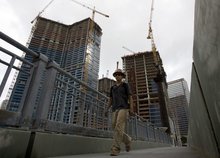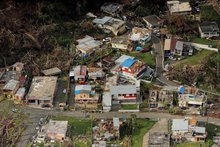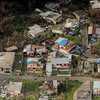0
News Article
Community:
Jun 4, 2019
A new study finds that higher percentages of wealthy, Asian, and white residents live in HOAs; and people pay a premium of about 4 percent for homes in HOAs.
Authored by: David Montgomery for CityLab
Topics: Community development, Housing, Legislation & Policy, Racial inequalities, Research
 Shared by Housing Is
Shared by Housing Is
Housing Is posted a
on Jun 6, 2019
David Montgomery for CityLab
A new study finds that higher percentages of wealthy, Asian, and white residents live in HOAs; and people pay a premium of about 4 percent for homes in HOAs.
0
News Article
Community:
Feb 5, 2019
Building more affordable housing units in the metros that are centers of innovation will increase demand for the wares that fill houses, and increase productivity.
Authored by: Richard Floriday for City Lab
Topics: Asset building, Community development, Housing, Legislation & Policy, Research
 Shared by Housing Is
Shared by Housing Is
Housing Is posted a
on Apr 4, 2019
Richard Floriday for City Lab
Building more affordable housing units in the metros that are centers of innovation will increase demand for the wares that fill houses, and increase productivity.
0
News Article
Community:
Mar 31, 2019
Miami is projected to face anywhere from 1 to 3 feet of sea level rise by 2060, and as sea levels rise, higher ground inland has started to look more and more desirable. Much of that higher ground is in the city's poorest neighborhoods, like Liberty City and Little Haiti. The shifting real estate landscape is just one example of how, in Miami, the effects of global warming are not hypothetical predictions but realities of everyday life, prompting action by government, businesses and individuals alike. Across the region, developers are changing how they build, wealthy homeowners are reinforcing their properties, and in communities that are farther from the coast — places like Liberty City — residents are working to make sure they don't have to leave their homes.
Authored by: Ian Stewart and Lulu Garcia-Navarro for NPR
Topics: Community development, Housing, Legislation & Policy, Low-income, Racial inequalities, South
 Shared by Housing Is
Shared by Housing Is
Housing Is posted a
on Apr 4, 2019
Ian Stewart and Lulu Garcia-Navarro for NPR
Miami is projected to face anywhere from 1 to 3 feet of sea level rise by 2060, and as sea levels rise, higher ground inland has started to look more and more desirable. Much of that higher ground is in the city's poorest neighborhoods, like Liberty City and Little Haiti.
0
News Article
Community:
Mar 18, 2019
Taller buildings in the hearts of more than two dozen neighborhoods, denser housing on some nearby blocks and requirements that developers help create affordable housing. That’s what Seattle is getting after the City Council voted unanimously Monday to approve some of the most sweeping zoning changes in the city’s recent history.
Authored by: Daniel Beekman for The Seattle Times
Topics: Community development, Housing, Legislation & Policy, Low-income
 Shared by Mica O'Brien
Shared by Mica O'Brien
Mica O'Brien posted a
on Mar 26, 2019
Daniel Beekman for The Seattle Times
Taller buildings in the hearts of more than two dozen neighborhoods, denser housing on some nearby blocks and requirements that developers help create affordable housing.
0
News Article
Community:
Mar 11, 2019
The housing crisis has given rise to acronyms which define the battle over new developments: "Yes in My Backyard" (YIMBYs) vs. “Not In My Backyard" (NIMBYs). And now there's a new acronym: PHIMBY, as in "Public Housing in My Backyard."
Authored by: Jessica Placzek for KQED
Topics: Community development, Housing, Legislation & Policy, West Coast
 Shared by Housing Is
Shared by Housing Is
Housing Is posted a
on Mar 11, 2019
The housing crisis has given rise to acronyms which define the battle over new developments: "Yes in My Backyard" (YIMBYs) vs. “Not In My Backyard" (NIMBYs). And now there's a new acronym: PHIMBY, as in "Public Housing in My Backyard."
0
News Article
Community:
Feb 28, 2019
Over the past decade, the real estate fortunes for African Americans have reversed course. Despite a strengthening economy, including record low unemployment and higher wages for black workers, homeownership levels for that group have dropped incrementally almost every year since 2004. It fell to 43 percent in 2017, virtually erasing all of the gains made since the passage of the Fair Housing Act in 1968, landmark legislation outlawing housing discrimination.
Authored by: Troy McMullen for The Washington Post
Topics: Asset building, Community development, Housing, Legislation & Policy, Racial inequalities
 Shared by Housing Is
Shared by Housing Is
Housing Is posted a
on Mar 11, 2019
Troy McMullen for The Washington Post
Over the past decade, the real estate fortunes for African Americans have reversed course. Despite a strengthening economy, including record low unemployment and higher wages for black workers, homeownership levels for that group have dropped incrementally almost every year since 2004.
0
News Article
Community:
Mar 5, 2019
Disasters are becoming more common in America. In the early and mid-20th century, fewer than 20 percent of U.S. counties experienced a disaster each year. Today, it's about 50 percent. According to the 2018 National Climate Assessment, climate change is already driving more severe droughts, floods and wildfires in the U.S. And those disasters are expensive. The federal government spends billions of dollars annually helping communities rebuild and prevent future damage. But an NPR investigation has found that across the country, white Americans and those with more wealth often receive more federal dollars after a disaster than do minorities and those with less wealth. Federal aid isn't necessarily allocated to those who need it most; it's allocated according to cost-benefit calculations meant to minimize taxpayer risk.
Authored by: Rebecca Hersher and Robert Benincasa for NPR
Topics: Community development, Funding, Housing, Legislation & Policy, Low-income, Racial inequalities, Research, Stability
 Shared by Mica O'Brien
Shared by Mica O'Brien
Mica O'Brien posted a
on Mar 7, 2019
Rebecca Hersher and Robert Benincasa for NPR
Disasters are becoming more common in America. In the early and mid-20th century, fewer than 20 percent of U.S. counties experienced a disaster each year. Today, it's about 50 percent.
0
News Article
Community:
Jan 30, 2019
The gas tax hasn’t budged since 1992, and highway trust fund is running on fumes. Could a Green New Deal pushed by Congress be a fix?
Authored by: Laura Bliss for CityLab
Topics: Community development, Funding, Housing, Legislation & Policy, Transportation
 Shared by Mica O'Brien
Shared by Mica O'Brien
Mica O'Brien posted a
on Feb 28, 2019
The gas tax hasn’t budged since 1992, and highway trust fund is running on fumes. Could a Green New Deal pushed by Congress be a fix?
0
News Article
Community:
Feb 4, 2019
The U.S. territory needs to urgently tackle issues such as "widespread informal housing" and "the exorbitant amount of abandoned spaces" as it rebuilds after Hurricane Maria.
Authored by: Nicole Acevedo for NBC News
Topics: Community development, Food insecurity, Funding, Homelessness, Housing, Legislation & Policy, Nutrition, Safety, Stability, U.S. Territories
 Shared by Housing Is
Shared by Housing Is
Housing Is posted a
on Feb 4, 2019
Nicole Acevedo for NBC News
The U.S. territory needs to urgently tackle issues such as "widespread informal housing" and "the exorbitant amount of abandoned spaces" as it rebuilds after Hurricane Maria.
0
News Article
Community:
Jan 22, 2019
Mayors from across the country believe that high housing costs and a lack of well-paying jobs are keeping more people from climbing the social ladder in their cities.
Authored by: Rick Rouan for The Columbus Dispatch
Topics: Community development, Housing, Legislation & Policy
 Shared by Housing Is
Shared by Housing Is
Housing Is posted a
on Jan 24, 2019
Rick Rouan for The Columbus Dispatch
Mayors from across the country believe that high housing costs and a lack of well-paying jobs are keeping more people from climbing the social ladder in their cities.
0
News Article
Community:
Nov 30, 2018
The city and county of Durham, GoTriangle and the Durham Housing Authority are committed to enhancing opportunities for existing low-income families as well as to increasing the production of affordable housing. The light-rail project is critical to the success of these goals, and the success of these goals is critical to the light-rail project.
Authored by: Anthony Scott and John Tallmadge for The Herald Sun
Topics: Community development, Funding, Housing, Legislation & Policy, Low-income, Partnerships, South, Stability, Transportation
 Shared by Mica O'Brien
Shared by Mica O'Brien
Mica O'Brien posted a
on Dec 3, 2018
Anthony Scott and John Tallmadge for The Herald Sun
The city and county of Durham, GoTriangle and the Durham Housing Authority are committed to enhancing opportunities for existing low-income families as well as to increasing the production of affordable housing.
0
News Article
Community:
Oct 3, 2018
For years, Dallas has poured millions of federal dollars into affordable housing, to little effect. But in May, the City Council unanimously passed a new comprehensive housing policy, a first for the city. The goal is to build 20,000 new homes — but only in select, pre-approved neighborhoods deemed ripe for revitalization.
Authored by: Teresa Wiltz for Stateline
Topics: Community development, Housing, Legislation & Policy, Low-income, Mobility, Racial inequalities, South
 Shared by Mica O'Brien
Shared by Mica O'Brien
Mica O'Brien posted a
on Oct 4, 2018
Teresa Wiltz for Stateline
For years, Dallas has poured millions of federal dollars into affordable housing, to little effect. But in May, the City Council unanimously passed a new comprehensive housing policy, a first for the city.
 Shared by Housing Is
on Jun 6, 2019
Shared by Housing Is
on Jun 6, 2019

 Shared by Housing Is
on Apr 4, 2019
Shared by Housing Is
on Apr 4, 2019


 Shared by Housing Is
on Apr 4, 2019
Shared by Housing Is
on Apr 4, 2019




 Shared by Housing Is
on Mar 11, 2019
Shared by Housing Is
on Mar 11, 2019

 Shared by Housing Is
on Mar 11, 2019
Shared by Housing Is
on Mar 11, 2019





 Shared by Housing Is
on Feb 4, 2019
Shared by Housing Is
on Feb 4, 2019

 Shared by Housing Is
on Jan 24, 2019
Shared by Housing Is
on Jan 24, 2019



